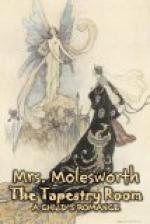“And Charlotte explained. Her husband was a sailor. To be near him, she had been in Spain at the outbreak of the revolution, and had remained there till he was ordered home. Now that the terror was subsiding, there was—for them, as foreigners—but little risk. She had persuaded her husband, whose vessel, owing to some slight accident at sea, had been obliged to put in at the neighbouring port, to let her come to have a look at the old town, at the old house, or garden rather, she still loved so dearly. ‘The house we used to live in,’ she said, ’was empty. I easily found my way in, and out on to the balcony, as you saw. I had a sort of wild idea that perhaps I might see or hear something of you. Yet I was almost afraid to ask, such terrible things have happened,’ added Charlotte, with a shudder.
“But nothing more terrible was in store for our young ladies, I am glad to say,” continued Dudu. “The faithful-hearted Charlotte and her husband were able to be of the greatest service to Mademoiselle Jeanne and her husband. They conveyed them in safety to the port and saw them on board a friendly vessel, and not many weeks passed before they were again with their children and the old Monsieur and Madame and Mademoiselle Eliane in their home for the time in Switzerland.”
“Oh, how glad I am!” exclaimed Jeanne. “I was dreadfully afraid your story was going to end badly, Dudu.”
“It is not ended yet,” said Dudu.
“Isn’t it?” cried Jeanne. “Oh dear, then go on quick, please. I hope Mademoiselle Jeanne’s poor husband——”
“Your great-grandfather, you mean,” corrected Dudu.
“Oh, well then, my great-grandfather, our great-grandfather, for he was Cheri’s, too, you said. I do so hope he got better. Did he, Dudu?”
“Yes,” said Dudu, “he got better, but never quite well again. However, he lived some years, long enough to see his boys grown up and to return—after the death of our old Monsieur and Madame—to return to his own country with his wife and sister-in-law. But before very long, while still far from an old man, he died. Then our young ladies, young no longer, came back, after a time, to their childish home; and here they lived together quietly, kind and charitable to all, cheered from time to time by the visits of Madame’s two sons, out in the world now and married, and with homes of their own. And time went on gently and uneventfully, and gradually Madame’s hair became quite, quite white, and Mademoiselle Eliane took to limping a little in her walk with the rheumatism, and when they slowly paced up and down the terrace it was difficult for me to think they were really my pretty young ladies with the white dresses and blue ribbons of half a century ago. For it was now just thirty-five years since the last visit of their English friend. She too, if she were alive, must be a woman of more than sixty. They had never heard of her again. In the hurry and anxiety of their last meeting they had forgotten to ask and she to give her exact address, so they could not write. She might have written to them to the old house perhaps, on the chance of it finding them; but if so, they had never got the letter. Yet they often spoke of her, and never saw the balcony at the end of the terrace without a kindly thought of those long ago days.




